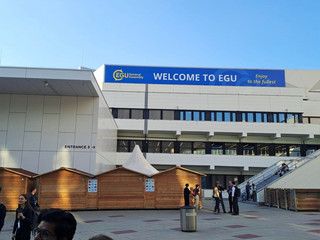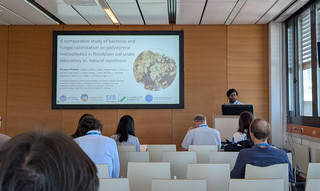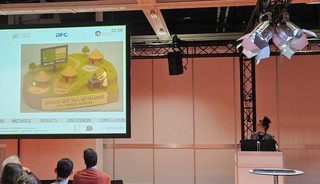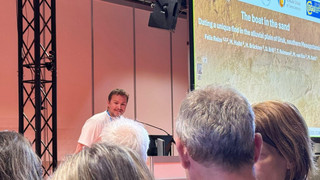We gratefully acknowledge the support provided by the GSGS Training and Networking Grant, which enabled our participation in the European Geosciences Union (EGU) General Assembly 2025. This premier geosciences conference offered invaluable opportunities for knowledge exchange, networking, and presenting our research to an international audience.
The EGU General Assembly 2025 brings together geoscientists from all over the world to one meeting covering all disciplines of the Earth, planetary, and space sciences. The EGU aims to provide a forum where scientists, especially early career researchers, can present their work and discuss their ideas with experts in all fields of geoscience. The EGU General Assembly 2025 welcomed 20,984 registered attendees, of whom 18,646 made their way to Vienna from 120 countries and 2,338 joined online from 104 countries. It was a great success with 18,934 presentations given in 1,102 sessions. Thereby, 56% of the abstracts were identified as contributions from Early Career Scientists (ECS).
I have got the first time opportunity to present my work at an interdisciplinary group in an international forum like EGU. Researchers appreciated the combined lab-field approach, suggesting further long-term field studies to assess seasonal variations. Connected with a group from the University of Wageningen working on similar microplastic experiments, and got some recommendations to integrate microbial community analysis to link bacterial and fungal composition to biodegradation potential. Discussions on heavy metal adsorption and microplastic transport studies were initiated with similar interested people, opening potential collaborations in the future.
Rizwan Khaleel
PhD candidate
Institute of Geography
Presentation title (oral): Understanding the formation and influence of soil-typical eco-coronas on microplastics through laboratory and field incubation experiments
Session: HS8.1.1 - Occurrence, fate, and remediation of natural and engineered particles and PFAS in aquatic and terrestrial systems
By attending the General Assembly of the European Geosciences Union (EGU), I had the opportunity to participate in organizing a panel for the first time as a session convener. This experience significantly enhanced my organizational skills. Additionally, I resented the results of my research on complex archaeological sediments using a novel methodological approach. The interactive PICO format proved to be quite useful for discussing my findings in detail with experts in my field, as it allows for the inclusion of supplementary information in the presentation. I would definitely recommend it!
Mirijam Zickel
PhD candidate
Institute of Geography
Presentation title (oral): Revealing Bronze Age Construction: Digital Micromorphology and Micro-XRF Analysis of Tell Toboliu Floors in Western Romania
Session: GM4.3 - New perspectives in geoarchaeology: human agency, landscape change, and how they shaped the late Quaternary
I attended the 2025 EGU General Assembly and presented my research in an interactive PICO format, combining a brief pitch with in-depth discussions via a touchscreen display. The format fostered dynamic scientific exchange and drew significant attention. I was honored that my presentation was selected as a Highlight Presentation, boosting its visibility. As a result, my work will be featured in ScienceShot, helping to expand its reach and impact within the scientific community. I’m very grateful to GSGS for their support and strongly encourage fellow PhD candidates to apply for this valuable funding.
Felix Reize
PhD candidate
Institute of Geography
Presentation title (oral): Timing of the First Mesopotamian Boat Unearthed in a Euphrates Paleochannel near Uruk (Iraq)
Session: GM4.3 - New perspectives in geoarchaeology: human agency, landscape change, and how they shaped the late Quaternary



